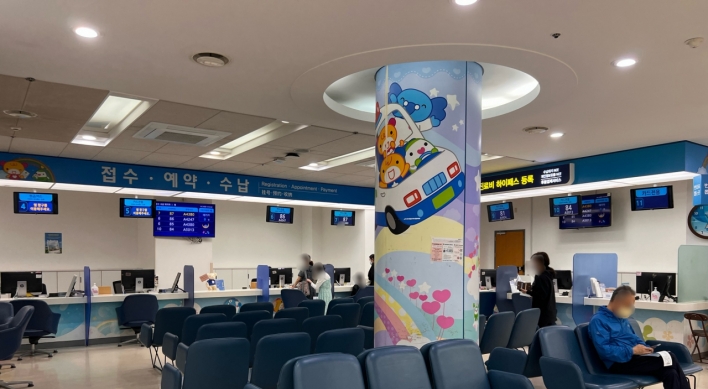In light of the deadly terror attack in Paris last month and the fear it sparked around the globe, many in South Korea also began reconsidering everyday safety.
Granted, amid the constant threat from the reclusive North Korea, coping with looming fear has become somewhat usual for Koreans for decades.
And various global indexes, including the Better Life Index 2015 by OECD, placed South Korea as one of the safest places to live, at No. 6.
Behind the unorthodox sense of security enjoyed by the public here are people working despite ridicule, hatred and controversy that come with the job.
From small patrol stations in suburban areas to branch offices in foreign countries protecting the basic rights of overseas Koreans, the national police have become one of the country’s largest government organizations closely associated with people’s lives.
Established in 1945, right after the nation’s independence from Japan’s colonial rule, Korea’s police now have more than 140,000 officers across the country, covering various fields of public safety, criminal investigation, intelligence, traffic, cybercrimes and security.
The police have applied the nation’s state-of-the-art IT technology to their equipment, vehicles and software to better prepare themselves against crimes. They analyze big data to foretell which regions are vulnerable to crimes and when they are likely to happen. To better deal with globalized crimes, the police seek bolstered cooperation with other law enforcement agencies around the world, including the U.S., China and Japan. Their successful model has also been benchmarked by authorities in emerging nations, with the Korean police providing training courses and know-how to countries like Guatemala and Iraq to strengthen public safety and security.
Over the years, the duty of the police also expanded from dealing with criminal and safety-related cases to growing societal problems. Child abuse, domestic violence and bullying as well as handling drug abuse cases and the homeless population have become the police’s major responsibility.
Granted, amid the constant threat from the reclusive North Korea, coping with looming fear has become somewhat usual for Koreans for decades.
And various global indexes, including the Better Life Index 2015 by OECD, placed South Korea as one of the safest places to live, at No. 6.
Behind the unorthodox sense of security enjoyed by the public here are people working despite ridicule, hatred and controversy that come with the job.
From small patrol stations in suburban areas to branch offices in foreign countries protecting the basic rights of overseas Koreans, the national police have become one of the country’s largest government organizations closely associated with people’s lives.
Established in 1945, right after the nation’s independence from Japan’s colonial rule, Korea’s police now have more than 140,000 officers across the country, covering various fields of public safety, criminal investigation, intelligence, traffic, cybercrimes and security.
The police have applied the nation’s state-of-the-art IT technology to their equipment, vehicles and software to better prepare themselves against crimes. They analyze big data to foretell which regions are vulnerable to crimes and when they are likely to happen. To better deal with globalized crimes, the police seek bolstered cooperation with other law enforcement agencies around the world, including the U.S., China and Japan. Their successful model has also been benchmarked by authorities in emerging nations, with the Korean police providing training courses and know-how to countries like Guatemala and Iraq to strengthen public safety and security.
Over the years, the duty of the police also expanded from dealing with criminal and safety-related cases to growing societal problems. Child abuse, domestic violence and bullying as well as handling drug abuse cases and the homeless population have become the police’s major responsibility.

These officers in uniform include Mapo Police Station’s inspector Song Joon-han, an amateur guitar player, who has been teaching music to students victimized from violence, to Choi Hyeon-joo, a 26-year-old female officer at Jinan Police Station, who was seen taking her socks and shoes off for an elderly dementia patient shivering in the cold earlier this year in a video clip that soon went viral on social media.
On Oct. 21, the day when the police was celebrating the organization’s 70th birthday, a police officer in Gyeongju, North Gyeongsang Province, was killed by train as he was helping a mentally ill kid who jumped onto the track.
Despite such everyday dedication and sacrifices of the good cops, the police have also been widely distrusted by the people ― mainly due to their past image of being a shield for the militant regime, and more recently, the disputable use of force at antigovernment rallies.
The police have constantly vowed before the public that they would safeguard human rights and become friends of people. Such promises also seem to reflect how the police want to wipe out the dark history of its role in blocking pro-democracy movements in the 1980s, said Pyo Chang-won, former professor at the Korean National Police University and a renowned profiler in Korea.
“The Korean police have gone through substantial developments in terms of technological aspects to deal with criminal cases, efficiency of the organization itself and the transparency in personnel management,” he said.
“It is imperative that the police show it will fulfill its duty of peacekeeping, rather than standing for the government, in order to gain the people’s trust.”
By Cho Chung-un (christory@heraldcorp.com)
-
Articles by Korea Herald





![[Herald Interview] Mom’s Touch seeks to replicate success in Japan](http://res.heraldm.com/phpwas/restmb_idxmake.php?idx=644&simg=/content/image/2024/04/29/20240429050568_0.jpg&u=)


![[News Focus] Lee tells Yoon that he has governed without political dialogue](http://res.heraldm.com/phpwas/restmb_idxmake.php?idx=644&simg=/content/image/2024/04/29/20240429050696_0.jpg&u=20240429210658)










![[Today’s K-pop] Seventeen sets sales record with best-of album](http://res.heraldm.com/phpwas/restmb_idxmake.php?idx=642&simg=/content/image/2024/04/30/20240430050818_0.jpg&u=)